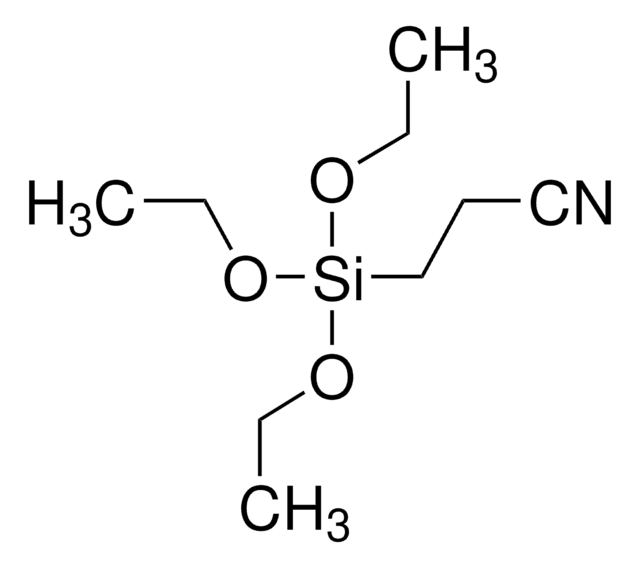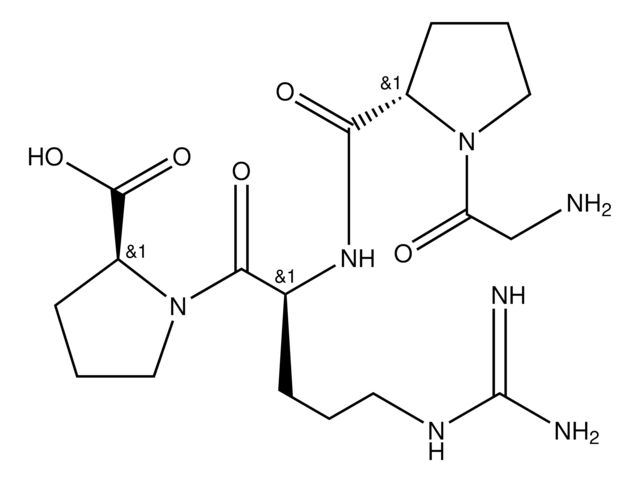435716
3-(Trihydroxysilyl)propyl methylphosphonate, monosodium salt solution
50 wt. % in H2O
Synonym(s):
Sodium 3-trihydroxysilylpropyl methylphosphonate
Sign Into View Organizational & Contract Pricing
All Photos(1)
About This Item
Linear Formula:
CH3P(O)(ONa)O(CH2)3Si(OH)3
CAS Number:
Molecular Weight:
238.18
EC Number:
MDL number:
UNSPSC Code:
12352100
PubChem Substance ID:
NACRES:
NA.22
form:
liquid
Recommended Products
form
liquid
Quality Level
concentration
50 wt. % in H2O
impurities
4 wt. % methyl alcohol
4 wt. % other silane-based salts
5 wt. % sodium methyl methylphosphonate
density
1.252 g/mL at 25 °C
SMILES string
[Na+].CP([O-])(=O)OCCC[Si](O)(O)O
InChI
1S/C4H13O6PSi.Na/c1-11(5,6)10-3-2-4-12(7,8)9;/h7-9H,2-4H2,1H3,(H,5,6);/q;+1/p-1
InChI key
MKAWPVONNWUREJ-UHFFFAOYSA-M
Application
3-(Trihydroxysilyl)propyl methylphosphonate, monosodium salt was used for the following syntheses:
- near-infrared dye-doped nanoparticles (NPs)
- as single silica source for the fabrication of phosphonate-rich organosilica layered hybrid material (PSLM)
- Gd/SiO2 nanoparticles
- mesoporous silica nanoparticles
- CdSe/ZnS/silica functionalized nanocrystals
Signal Word
Warning
Hazard Statements
Precautionary Statements
Hazard Classifications
STOT SE 2
Target Organs
Eyes,Central nervous system
Storage Class Code
10 - Combustible liquids
WGK
WGK 3
Flash Point(F)
174.2 °F
Flash Point(C)
79 °C
Choose from one of the most recent versions:
Already Own This Product?
Find documentation for the products that you have recently purchased in the Document Library.
Customers Also Viewed
Chris Daikopoulos et al.
Journal of hazardous materials, 270, 118-126 (2014-02-26)
A phosphonate-rich organosilica layered hybrid material (PSLM) made of 3-(trihydroxysilyl)propyl methylphosphonate, monosodium salt, as the single silica source, has been obtained from its aqueous solution through a xerogel process and mild thermal aging. The method is simple, affording bulk quantities
Mesoporous silica nanoparticles facilitate delivery of siRNA to shutdown signaling pathways in mammalian cells.
Christopher Hom et al.
Small (Weinheim an der Bergstrasse, Germany), 6(11), 1185-1190 (2010-05-13)
Robert I Nooney et al.
Analytical and bioanalytical chemistry, 393(4), 1143-1149 (2008-10-11)
There is substantial interest in the development of near-infrared dye-doped nanoparticles (NPs) for a range of applications including immunocytochemistry, immunosorbent assays, flow cytometry, and DNA/protein microarray analysis. The main motivation for this work is the significant increase in NP fluorescence
Preparation and properties of various magnetic nanoparticles.
Drbohlavova J, et al.
Sensors, 9(4), 2352-2362 (2009)
Sławomir Oszwałdowski et al.
Analytical and bioanalytical chemistry, 399(8), 2831-2842 (2011-01-27)
In the present work, CdSe nanocrystals (NCs) synthesized with a trioctylphosphine surface passivation layer were modified using amphiphilic molecules to form a surface bilayer capable of providing stable NCs aqueous solutions. Such modified nanocrystals were used as a test solute
Our team of scientists has experience in all areas of research including Life Science, Material Science, Chemical Synthesis, Chromatography, Analytical and many others.
Contact Technical Service












![3-[Bis(2-hydroxyethyl)amino]propyl-triethoxysilane solution technical, ~65% in ethanol](/deepweb/assets/sigmaaldrich/product/structures/346/789/6478c69e-26fa-46c4-919d-d90c61bc72ee/640/6478c69e-26fa-46c4-919d-d90c61bc72ee.png)